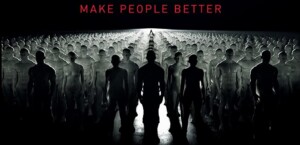Written by A. Hammouda: Make People Better is the title of the documentary released in 2022, which revolves around the Chinese scientist He Jiankui and his CRISPR human genome editing, experimenting on two twin embryos.
The film emphasizes that a revolution is happening that will transform the environment, society, and even us. Scientists now can modify DNA in profound new ways. That can mean damaging a gene to turn it off, correcting a mistake, or inserting a new gene.
Did He Jiankui Make People Better?
In early 2018, Dr. He Jiankui, a then-34-year-old Chinese biophysicist met the Nobel Prize-winning geneticist James Watson, who first proposed the double helix structure of DNA molecules back in 1953. Dr. He had reservations about his big new experiment, genetically engineering embryos to eliminate their risk for disease. “Do you think that that’s a good thing to do?” he asked Watson. The 90-year-old geneticist responded with just three words: “Make people better”.
Earlier that same year, Dr. He recruited a couple where the man was infected with HIV. They allowed him to edit the DNA of their twin IVF embryos. He did it with CRISPR technology, disabling the CCR5 gene that enables HIV infection, thus making the twins virtually immune to AIDS.
Dr. He’s intentions seemed noble. He believed that “preventing disease is even more important than treating the disease”. With embryo gene editing, “one shot solves the problem”, “I call it a genetic vaccine”, he said. “If we can help these families protect their children, it’s inhuman for us not to”.
Whether he did indeed “make people better” is open to debate
Lulu and Nana, the gene-edited babies, were born in November of 2018, and immediately became international news. Many within the scientific community were horrified, with some dubbing him “China’s Dr Frankenstein”. Dr. He’s actions were called “crazy”, “a huge blow to the global reputation and development of Chinese science”, “scientifically foolish and morally reprehensive”, “scientific and ethical disaster” and “violated literally every ethical principle in the rulebook.”
The subject of Dr. He’s HIV-resistant gene editing experiment, Lulu and Nana, are now toddlers, and both are still alive and (at the moment) perfectly healthy. But their future remains uncertain. It’s not clear what health consequences will be suffered by them during their lifetimes. Only time will tell.
Dr. He conducted the trials in secret, unknown to the university where he was employed (and who funded him with research money), the Southern University of Science and Technology in the Chinese city of Shenzhen, who quickly denounced Dr. He’s research, calling it “a serious violation of academic ethics and academic norms”.
In December of 2019, Dr. He was convicted of “illegal medical practice” for his gene editing experiments and sentenced to three years in prison and fined three million yuan (around $427,000). Dr. He, now 38, was released from prison in April, and is already staging a comeback. He promised that he intends to cure Duchenne muscular dystrophy, but only if he receives a public donation of one billion.
What kind of future will we create?
To make people better by editing the human genome is an extremely sensitive subject. CRISPR is a new technique that allows for precise and cheap editing of the genome. It now costs 100 times less than a decade ago to edit a gene. As the cost of modifying a genome goes down, the power of genetic engineering goes up. In less than a decade, human application of CRISPR transformed from experimental research into clinical translation, with huge implications in genetic and acquired diseases. The best-case scenario is that we use this technology to cure disease, to become more healthy versions of ourselves.
Many scientists are concerned that the public is not part of this process. International scientific communities recognize that the social, ethical, and medical benefits (and risks) of gene editing technologies need to be better understood by the public.
Many questions arise and need to be answered. Would you enhance the intelligence of your child if everyone else was? Should wealthy people live much longer than everyone else? Can soldiers be genetically modified to protect them from a new era of bioweapons? Is the risk of a pandemic virus greater from the lab of a rogue scientist or the garage of a biohacker? How should we draw a line between genetic modifications for health and vanity traits? Or should we draw a line at all?
With a technology this much accessible and widely adopted, how should we regulate the usage or react to unexpected developments globally? Are we playing God? It is now the time to develop a framework of ethical rules of what could be done and how it could be used.
Sources:
How one scientist lost big trying to genetically ‘enhance’ unborn babies.
See also:
Gene Editing for Sickle Cell Disease Succeeded
Go to the News Board

